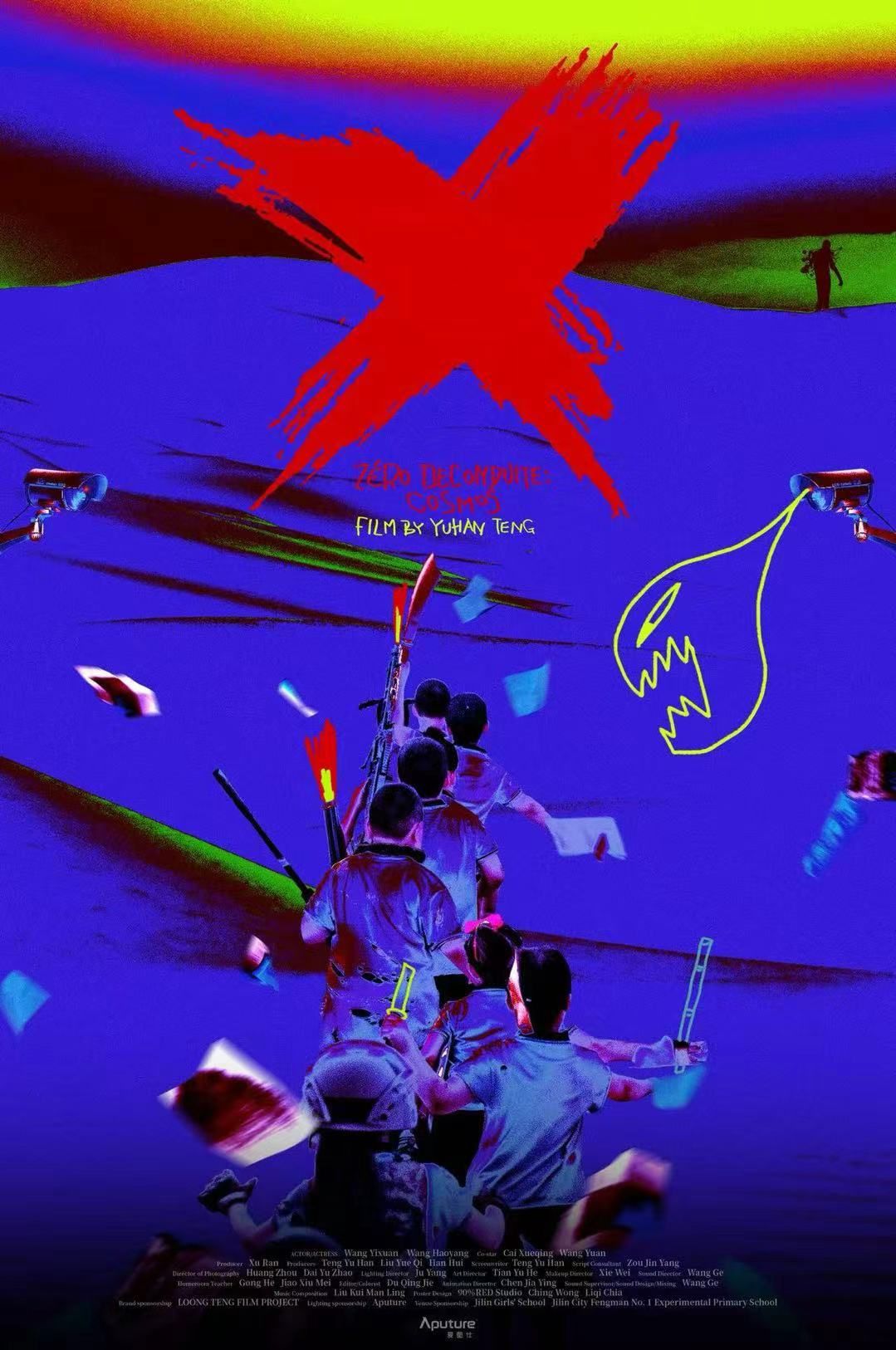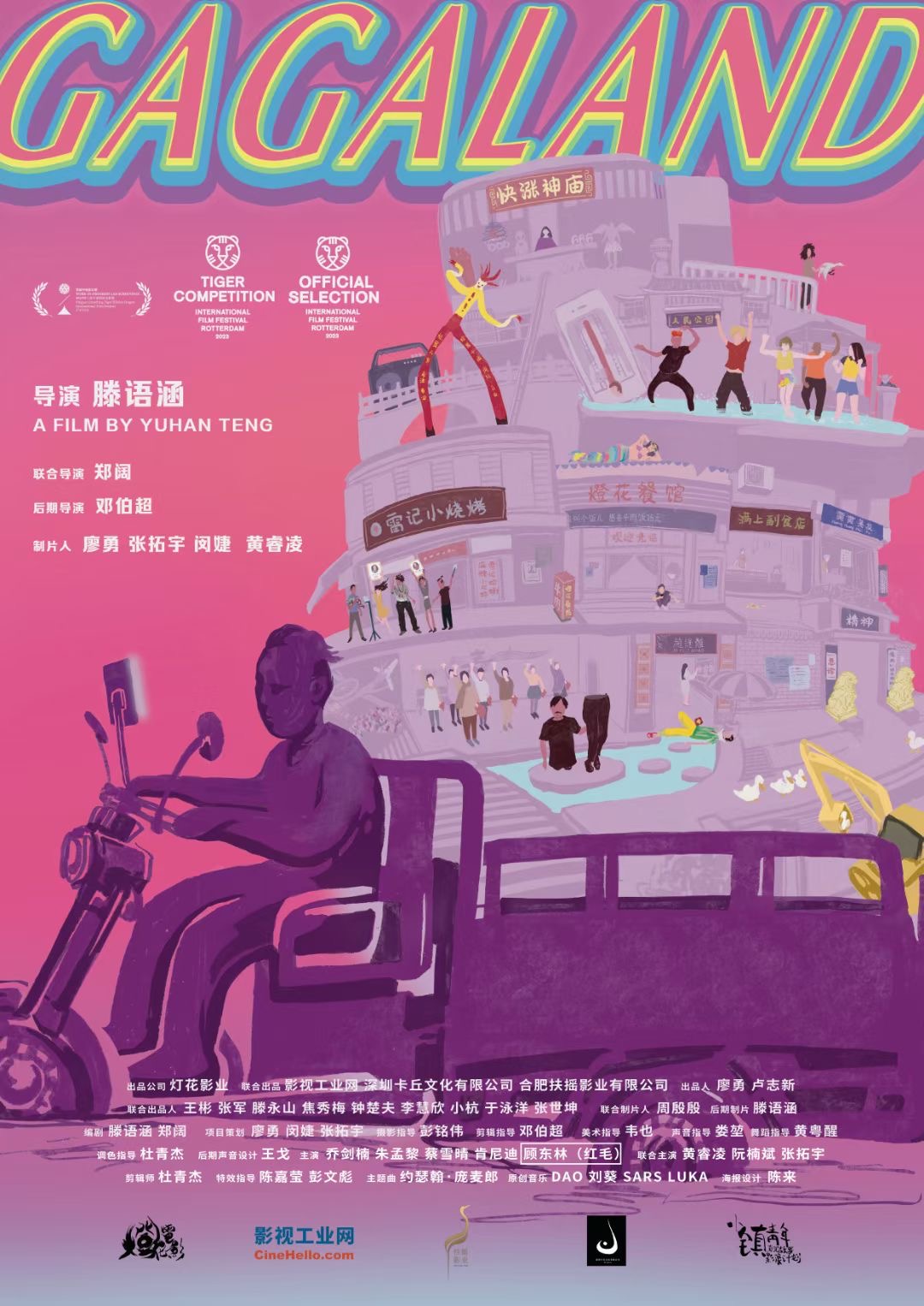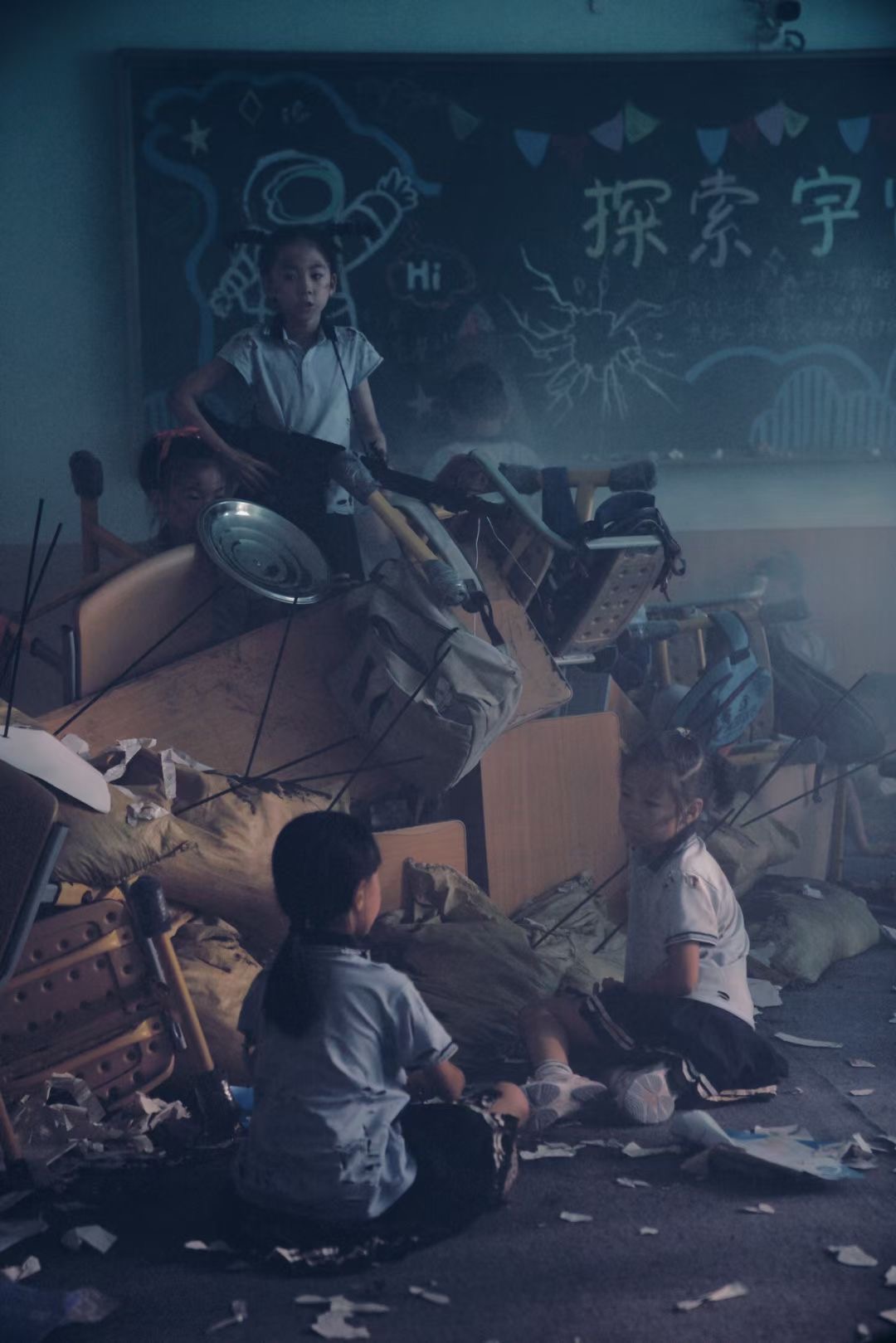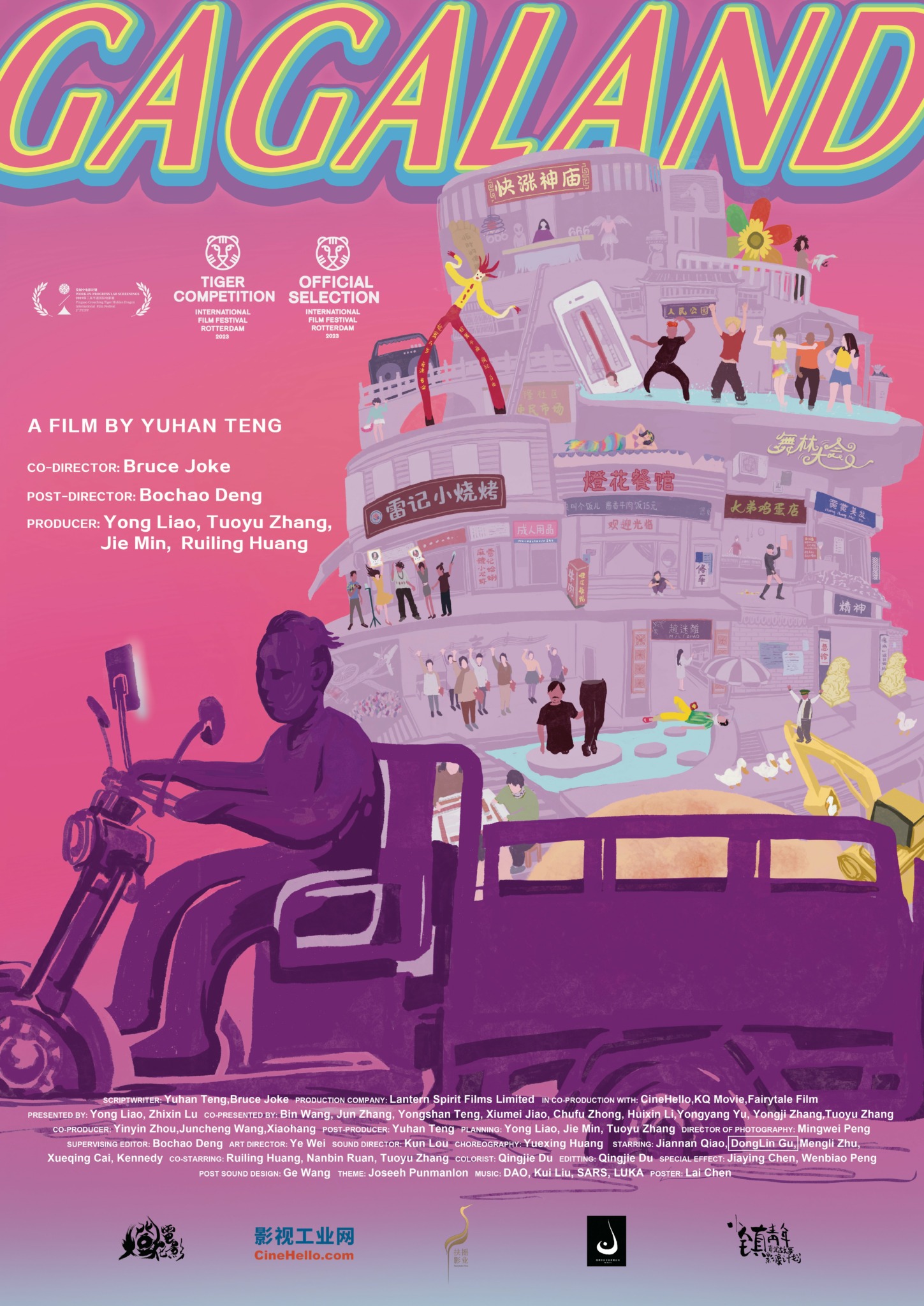Alright – so today we’ve got the honor of introducing you to YUHAN TENG. We think you’ll enjoy our conversation, we’ve shared it below.
YUHAN , looking forward to hearing all of your stories today. Can you talk to us about a project that’s meant a lot to you?
My most meaningful project is my debut feature film, GAGALAND, which I began directing at 19. Selected for the main competition at the 2023 Rotterdam International Film Festival and nominated for the Tiger Award, this film marked a five-year journey from knowing nothing about filmmaking to its completion. I dropped out of Beijing Film Academy midway, but I consider GAGALAND my true “university.” The film tells a simple yet absurd story: K-di, escaping a duck feather factory, becomes enamored with Xiao Pili and joins the Red Hair Dance Troupe during their critical preparation for a dance competition, unfolding a bizarre narrative.
GAGALAND stands out for its “low-budget special effects,” blending live streaming, documentary, narrative, and avant-garde filmmaking to vividly portray contemporary China’s grassroots “tacky-fantastic” culture. It breaks boundaries between art cinema, short-video culture, and live-streaming lifestyles. Inspired by China’s reality in 2016, when Kuaishou (a Chinese short-video platform) was thriving with raw, unpolished aesthetics, I was captivated by its untamed and authentic visual language, far from today’s commercialized trends. In 2017, I read a report about Kuaishou’s “laotie” (streamers), detailing the journey of the Red Hair GAGADANCE Emperor, filled with gang rivalries and vibrant, free-spirited GAGADANCE. Unlike ballet (which seeks strength and beauty) or square dancing (which emphasizes uniformity), GAGADANCE—often jokingly called “chaotic group dance”—celebrates individuality: unique moves, unique worlds. With no barriers to entry, anyone with limbs can dance. It’s a liberating, joyful dance existing solely for happiness, widely practiced on the streets and forming a distinctive subculture. GAGADANCE is an anti-mainstream phenomenon—ruleless, music-driven, expressive, and rebellious.
After learning about this, my producer and I instantly clicked and traveled to Zhengzhou, China—the birthplace of GAGADANCE—to seek out the Red Hair Emperor. There, we experienced the captivating charm of GAGADANCE firsthand and resolved to create a film about it.
In Zhengzhou’s streets, we immersed ourselves in the vibrant GAGADANCE scene, living and eating alongside the dancers to document their stories. The Red Hair Emperor’s authenticity and charisma deeply moved us; his GAGADANCE was not just a dance but a declaration of freedom. We decided to center GAGALAND around him, crafting a narrative framework that captured the raw beauty of this culture through authentic cinematography, infused with absurdist comedy to create a film that was both grounded and artistically bold.
Despite years of delays due to the COVID-19 pandemic, we completed the project hoping to stay true to our initial goal: creating a film for Kuaishou’s “laotie” community, exemplified by the Red Hair Emperor, that they would not only cherish but also love to watch and easily understand. We tried to tell a simple story using raw, authentic visuals and a collage-like, slightly fantastical aesthetic to highlight a vibrant yet often overlooked group—people labeled as “marginalized” but rarely given their own cinematic voice. Our aim was to make a film that resonates with the laotie, reflecting a China distinct from that of traditional art films, striving to share their stories with a wider audience.
Making GAGALAND was a rollercoaster of hardships—let’s face it, young indie filmmakers like us are basically broke superheroes with empty pockets. Yet, I truly believe this film radiates joy, and joy is the ultimate treasure. In a world that often rules by stealing your happiness, choosing joy becomes the most revolutionary act. This journey taught me not just the craft of filmmaking, but more importantly, how to love real people and the raw, beautiful mess of life!
At the same time, GAGALAND carried me onto the international stage, opening up a wider world for my future filmmaking journey.

YUHAN , love having you share your insights with us. Before we ask you more questions, maybe you can take a moment to introduce yourself to our readers who might have missed our earlier conversations?
I’m Yuhan Teng, born in December 1998 in Jilin, China, working across filmmaking, contemporary art, and writing, with a focus on cinema, art, and creative development. My style leans toward magical realist narratives, experimental films blending documentary and fiction, and low-budget dramas, centered on marginalized communities, subcultures, and interdisciplinary ideas. My love for film started young—in middle school, I skipped classes to found the Jilin Zero Score Film Salon (without telling my parents), organizing indie screenings and connecting with filmmakers and festivals. That passion still drives me forward.
In 2016, I won the National New Concept Writing Award and graduated from the Li Xianting Independent Film School. The next year, I was honored to enter the Beijing Film Academy’s Department of Literature as the top-scoring applicant nationwide. In 2021, I chose to leave the academy to pursue a freer creative path—a decision both thrilling and challenging.
That same year, I founded LOONG TENG, an art brand focused on creative development and sales. Over four years, I’ve led over 100 students in creative writing, with three projects now in film development. This work isn’t just about writing—it’s about connecting, healing, and opening up new horizons together. I also launched my online channel, @Teng Xuefei Long’s Movie Life, sharing my perspectives on film and culture to engage a global audience.
My debut feature, GAGALAND—a blend of drama, music, and fantasy—premiered at major international film festivals. It was selected for the Works in Progress section at the 2019 Pingyao International Film Festival, nominated for the Tiger Award in the Main Competition at the 2023 Rotterdam International Film Festival, and screened in the Frontier Competition at South Korea’s DMZ International Documentary Film Festival and the Film Competition Section at Sydney’s South by Southwest (SXSW) Art Festival. These experiences have shown me the boundless possibilities of storytelling.
Beyond film, I’ve explored contemporary art. In 2020, I moved to Dongguan to work in a factory, documenting life as both a director and a worker, creating art performances and video works like World 1, exhibited at the Fei Art Museum in Guangdong in 2021, and Where Did Teng Yuhan’s Snowman Go?, shown at Boundless-Flow in New York in 2022. I’m now working long-term on a project about Chinese factories, perhaps a unique workers’ love story.
In 2023, I served as a final judge for the Hainan New Wave Author Image Exhibition, contributing to China’s vibrant film and art scenes. Looking ahead, I’m excited to explore AI-driven visual storytelling or VR documentaries, as every new technology could become a tool for my creations. This journey is full of challenges, but I believe through storytelling, we can connect more stories and light up a bigger world.

Any insights you can share with us about how you built up your social media presence?
My social media following is modest—around 10,000 fans—but I believe the key to engaging an audience is sticking to what you’re good at. Straying too far from your strengths can be draining over time. For me, filmmaking is my forte, and my audience loves movies. I connect with them by sharing insights on low-budget filmmaking, using examples like The Blair Witch Project to break down practical techniques and strategies. The data from these posts speaks for itself—they resonate strongly with viewers.
For those just starting out, my advice is to keep asking yourself: “What do I want to achieve with this platform?” Don’t fall into the trap of chasing algorithms or fleeting trends. Building an online presence is a long-term journey. Staying authentic and focused helps forge real connections with your audience, keeping them engaged and coming back for more

Any resources you can share with us that might be helpful to other creatives?
As a Chinese independent filmmaker, I’m eager to discover resources that bridge the information gap between me and the English-speaking film world. I want to learn about international platforms and film funds like the Sundance Institute, Film Independent, or Europe’s TorinoFilmLab, which offer grants, training, and exposure for indie projects. I’d love to connect with global production teams to broaden my creative perspective, perhaps through co-productions that bring my magical realist narratives and focus on marginalized communities to international audiences.
I’m also excited about artist residency programs, such as China Residencies or other global initiatives, which provide creative spaces and chances to collaborate with artists from diverse backgrounds, sparking new ideas. Additionally, Chinese cinema remains niche on the world stage, so I’d value early connections with international distributors like Strand Releasing or Cohen Media Group, known for championing independent and global films. These resources would help me share Chinese stories with the world and find a wider resonance for my work
Contact Info:
- Instagram: YUHANTENGFILM
- Other: [email protected]



